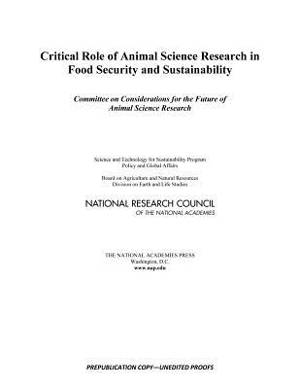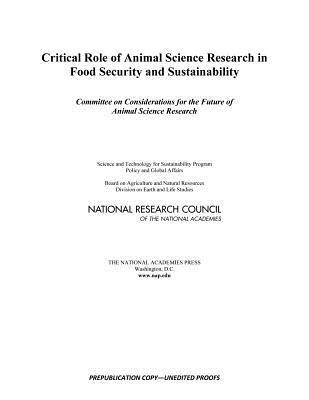
- Retrait gratuit dans votre magasin Club
- 7.000.000 titres dans notre catalogue
- Payer en toute sécurité
- Toujours un magasin près de chez vous
- Retrait gratuit dans votre magasin Club
- 7.000.0000 titres dans notre catalogue
- Payer en toute sécurité
- Toujours un magasin près de chez vous
Critical Role of Animal Science Research in Food Security and Sustainability
National Research Council, Division on Earth and Life Sciences, Board on Agriculture and Natural Resources, Policy and Global Affairs, Science and Technology for Sustainability Program, Committee on Considerations for the Future of Animal Science ResDescription
By 2050 the world's population is projected to grow by one-third, reaching between 9 and 10 billion. With globalization and expected growth in global affluence, a substantial increase in per capita meat, dairy, and fish consumption is also anticipated. The demand for calories from animal products will nearly double, highlighting the critical importance of the world's animal agriculture system. Meeting the nutritional needs of this population and its demand for animal products will require a significant investment of resources as well as policy changes that are supportive of agricultural production. Ensuring sustainable agricultural growth will be essential to addressing this global challenge to food security.
Critical Role of Animal Science Research in Food Security and Sustainability identifies areas of research and development, technology, and resource needs for research in the field of animal agriculture, both nationally and internationally. This report assesses the global demand for products of animal origin in 2050 within the framework of ensuring global food security; evaluates how climate change and natural resource constraints may impact the ability to meet future global demand for animal products in sustainable production systems; and identifies factors that may impact the ability of the United States to meet demand for animal products, including the need for trained human capital, product safety and quality, and effective communication and adoption of new knowledge, information, and technologies.
The agricultural sector worldwide faces numerous daunting challenges that will require innovations, new technologies, and new ways of approaching agriculture if the food, feed, and fiber needs of the global population are to be met. The recommendations of Critical Role of Animal Science Research in Food Security and Sustainability will inform a new roadmap for animal science research to meet the challenges of sustainable animal production in the 21st century.
Spécifications
Parties prenantes
- Auteur(s) :
- Editeur:
Contenu
- Nombre de pages :
- 436
- Langue:
- Anglais
Caractéristiques
- EAN:
- 9780309316446
- Date de parution :
- 01-05-15
- Format:
- Livre broché
- Format numérique:
- Trade paperback (VS)
- Dimensions :
- 152 mm x 229 mm
- Poids :
- 725 g

Les avis
Nous publions uniquement les avis qui respectent les conditions requises. Consultez nos conditions pour les avis.






